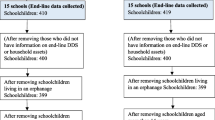Abstract
Objective
To assess factors contributing to positive deviance among the urban poor of Vadodara city.
Methods
Mothers of sixty 6–18 mo old children- 30 each in positive deviant (PD: normal by weight-age) and negative deviant (ND: grade II by weight-age) groups—were interviewed through home visits using semi-structured questionnaires.
Results
Factors contributing significantly to PD (p < 0.01): PD children (vs. ND), were older (12–18 mo vs. 6–11 mo); families were smaller (5–7 vs. >7 members), of lower parity (1–2 vs. 3–4), greater birth interval (>3 y vs. 1–2 y); received colostrum (96% vs. 26%), breastfed atleast 8–9 times/d (86% vs. 20%); were started on complementary feeds (CF) at 6–8 mo (53% vs. 23%); given thicker consistency CF (73% vs. 36%); fed actively (40% vs. 23%), fewer had diarrhea episodes in past 15 d (26% vs. 83%). Mean calorie intake (% RDA) from CF among PD was significantly higher than in ND (68% vs.42%).
Conclusions
Factors contributing to PD in urban poor families are similar to those reported in rural India; which implies that ICDS-Health services for both urban and rural poor need to ensure that national IYCF guidelines—healthcare recommendations are followed by communities. Further research relating PD to desirable complementary feeding and hygiene-healthcare practices in rural and urban areas is required.

Similar content being viewed by others
References
Zeitlin M. Nutrition resilience in a hostile environment: positive deviance in nutrition. Nutr Rev. 1991;49:259–68.
Food and Agriculture Organization of the United Nations. The state of food insecurity in the world. Viale delle Terme di Caracalla, Rome, Italy; 2004.
National Family Health Survey—NFHS-III. International institute for population sciences, Bombay; 2005–06.
Sethi V, Kashyap S, Aggarwal S, Pandey RM, Kondal D. Positive deviance determinants in young infants in rural Uttar Pradesh. Indian J Pediatr. 2007;74:78–9.
Mustaphi P. Addressing malnutrition through surveillance and innovative community based strategy: UNICEF knowledge community on children in India; 2005. p. 16–18.
World Health Organization. Child Growth Standards. http://www.who.int/childgrowth/standards/chart_catalogue/en/index.html
National Institute of Nutrition. Nutrient requirements and recommended dietary allowances for Indians. Indian Council of Medical Research, NIN, Hyderdabad; 2009.
Shameera SM, Shobha AL. Positive and negative deviance in growth of urban slum children in Bombay. Food Nutr Bull. 1991;18:38–42.
Shekhar M, Habicht JP, Latham MC. Use of positive—negative deviant analysis to improve programme targeting services: Tamil Nadu integrated nutrition project. Int J Epidemiol. 1992;2:707–13.
Zeitlin M, Ghassemi H, Mansour M. Positive deviance in child nutrition with emphasis on psychosocial and implications for development. Food and Nutrition Bulletin, Supplement 14: The United Nations University; 1990
Graves PL. Nutrition and infant behavior: a replication study in the Katmandu valley, Nepal. Am J Clin Nutr. 1978;31:541–51.
Acknowledgements
For the successful implementation of the study and home visit intervention, the authors would like to acknowledge the co-operation and enthusiasm of CDPO of Ghatak I, Vadodara city; as well as the support extended by the Chief Medical Officer and Family Welfare Medical Officer of Vadodara Municipal Corporation.
Conflict of Interest
None.
Role of Funding Source
The funds for the research were obtained from Department resources under the UGC-DSA-SAPII program.
Author information
Authors and Affiliations
Corresponding author
Rights and permissions
About this article
Cite this article
Kanani, S., Popat, K. Growing Normally in an Urban Environment: Positive Deviance among Slum Children of Vadodara, India. Indian J Pediatr 79, 606–611 (2012). https://doi.org/10.1007/s12098-011-0612-9
Received:
Accepted:
Published:
Issue Date:
DOI: https://doi.org/10.1007/s12098-011-0612-9




